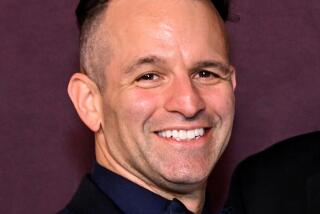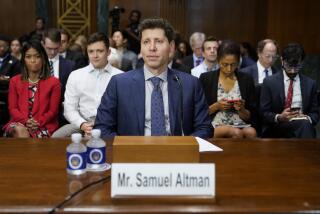The Big-Game Hunter Behind Vivendi Coup
- Share via
In France, his colleagues call him “Crocodile Claude.”
It’s a fitting moniker for Claude Bebear, whose passion for big-game hunting rivals his zest for buying up smaller companies. His predatory instincts helped him build one of the world’s largest insurance companies, Axa.
Bebear, 66, may have nabbed his biggest prey yet in Jean-Marie Messier, the fallen media king of Vivendi Universal whose dramatic ouster Bebear helped engineer.
Many reasons were behind Messier’s spectacular flameout: He was an architect of muddled strategy, he built up huge debt from a two-year buying spree, and his communications with investors were clumsy and often contradictory.
But Messier’s downfall ultimately came down to politics. He lost the support of his French boardroom allies that had been his bulwark against a hostile North American faction led by the Bronfman family of Canada, which blamed Messier for a nearly $2-billion loss in the value of its holdings.
Its coup against Messier last week, however, would not have succeeded had it not been for Bebear. Soft-spoken, with a neat shock of white hair, the man who sometimes is called the godfather of French capitalism methodically worked behind the scenes to rally French board members against the onetime boy wonder of French capitalism, many observers say.
Bebear “was the ringleader,” said Marie-Paule Virard, author of a recent book on the French business elite. “He played a critical role in Messier’s firing.”
With the flamboyant chief executive gone, Bebear will play an even more important role in the future of Vivendi, owner of Universal Studios and Universal Music Group. At the same emergency board meeting where Messier’s resignation was made final, Bebear was named to a seat on Vivendi’s 17-member board and heads a key finance committee charged with the task of averting a financial collapse. The company is said to be close to working out a deal with lenders.
Vivendi’s new management team, led by new CEO Jean-Rene Fourtou, acknowledged last week that the company faced a short-term cash crunch, disclosing that it must pay 1.8 billion euros to lenders by the end of this month.
In an e-mail to employees Monday, Fourtou downplayed speculation that he would immediately begin the breakup of the company. “My top priority over the next few days is to solve our company’s short-term liquidity problems. I am convinced that we will succeed because, beyond this difficult situation, the majority of Vivendi Universal’s businesses are doing well and form a strong asset.”
As Vivendi seeks to buy more time with lenders, the company will depend heavily on Bebear, who is well-regarded by the French banks because of his track record at Axa. In 20 years, he turned a small mutual insurance firm in Normandy into one of the world’s largest insurers. He did so through a series of takeovers, including acquiring a majority stake in U.S. insurance powerhouse Equitable Life Assurance Society of the U.S. in 1991. Its holdings include Alliance Capital Management, a leading seller of mutual funds.
Bebear also has close ties to the same French banks that threatened to pull the credit plug on Vivendi if Messier wasn’t ousted, according to sources close to the board. Bebear is a director of Banque National de Paris, one of Vivendi’s top lenders.
A lover of Chinese art and fine wines, Bebear once compared managing Axa to hunting, setting his sights on a target and bagging it, whether it was a gazelle or a rival insurance company. He told an interviewer in 1997, “There are always plenty of opportunities in the world. You have to study them, and when you realize they are true opportunities, to pounce on them.”
In an interview with French weekly Le Point, Messier accused Bebear of working to oust him so he could remain the only French executive who had succeeded in the United States. Bebear declined to comment.
Bebear and Axa, it turns out, have had a contentious relationship with Hollywood.
Axa was a key player in film financing from 1994 to 1998, when the company wrote $2 billion worth of insurance policies guaranteeing that banks would be paid even if film revenues fell short and didn’t cover costs. Axa covered more than 100 movies, including “The Saint,” “U-Turn” and “The Mirror Has Two Faces.”
Despite huge premiums, the policies were a big loser for Axa. The company took a $1-billion reserve against losses and is embroiled in a lawsuit accusing the Hollywood bankers of fraud.
The plot to unseat Messier began in May, when Bebear said in a radio interview that Vivendi has “a strategy and a decision problem” and suggested that the board remove Messier. He told French newspaper Le Monde that he was concerned that an “accident” with Vivendi could spread to other publicly traded French companies. Bebear is chairman of Axa, which owned 5.7 million shares of Vivendi at the end of 2001.
“That was a very rare public and startling commentary that was a real clarion call,” said Jeffrey Sonnenfeld, associate dean of the Yale School of Management.
His remarks didn’t surprise his compatriots, who regard him as a sort of French Warren Buffett.
Said Virard: “Bebear above all is concerned about the image of the French business establishment and the effect Vivendi’s problems would have on French banks.”
His admonishment couldn’t have come at a worse time for Messier. Vivendi’s stock price was plummeting, and Messier had barely survived a management crisis at the company’s European pay-TV arm Canal Plus. Messier’s firing of Canal Plus Chairman Pierre Lescure, coupled with critical remarks he made about French film subsidies, sparked an uproar in France and fed a perception that Messier was selling out to Hollywood. That suspicion was only intensified by Messier’s move to New York.
Messier further offended the French establishment with his love of the limelight and his autobiography, in which he committed the taboo of criticizing another French executive. “He [Bebear] wanted to throw Messier out because he was not in the club,” Virard added.
Despite the ill feeling against him, Messier survived the first attempt by the Bronfmans to unseat him at a contentious May 29 board meeting, thanks to the support of French members.
But over the next month, Bebear’s influence was evident as key French board members turned against Messier. They included Bebear’s friends Bernard Arnault, chairman of luxury goods maker LVMH Moet Hennessy Louis Vuitton, who resigned from the board a week before Messier’s ouster, and Henri Lachmann, who is CEO of Schneider Electric.
Bebear also has close ties to Fourtou.
The two are good friends who in the early 1980s joined to create Enterprises et Cites, an elite club of France’s top bankers and business executives. Lachmann also is a member of the club.
Typical of the interlocking relationships among French boards, Fourtou sits on Axa’s board, and Bebear sits on Lachmann’s Schneider Electric board.
“He made the careers of Lachmann and Fourtou,” Virard said. “It’s a club of friends.”
*
Times staff writers Corie Brown and Terril Yue Jones contributed to this report.
More to Read
Inside the business of entertainment
The Wide Shot brings you news, analysis and insights on everything from streaming wars to production — and what it all means for the future.
You may occasionally receive promotional content from the Los Angeles Times.











